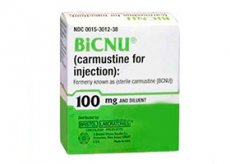Medical expert of the article
New publications
Preparations
Biknu
Last reviewed: 03.07.2025

All iLive content is medically reviewed or fact checked to ensure as much factual accuracy as possible.
We have strict sourcing guidelines and only link to reputable media sites, academic research institutions and, whenever possible, medically peer reviewed studies. Note that the numbers in parentheses ([1], [2], etc.) are clickable links to these studies.
If you feel that any of our content is inaccurate, out-of-date, or otherwise questionable, please select it and press Ctrl + Enter.

Biknu is an anticancer therapeutic drug.
Indications Biknu
It is used in the following conditions:
- neoplasms in the brain (brain stem glioma, astrocytoma, glioblastoma or medulloblastoma, as well as ependymoma);
- brain tumors with metastases;
- myeloma disease (used together with prednisolone);
- Hodgkin's lymphoma (in combination with other medications);
- lymphomas of non-Hodgkin's etiology.
Release form
The drug is released in the form of powder for the production of infusion fluid, in vials. The box contains 1 such vial, to which a container with a special solvent is attached.
Pharmacodynamics
Biknu is an antitumor drug with an alkylating effect. It belongs to the category of nitrosourea derivatives. It has an effect on phosphate and basic DNA groups, resulting in breaks and cross-links of their molecules.
The drug is a cyclonon-specific compound. The effect of carmustine may also develop due to protein modification.
Pharmacokinetics
The drug undergoes intrahepatic metabolism at high speed, during which active metabolic products are formed. The latter can persist in the blood plasma for several days.
The active element passes through the BBB.
Excretion occurs mostly through the kidneys – 60-70% (in the form of metabolic products). Another 1% is excreted with feces and 10% through the respiratory tract.
Dosing and administration
The infusion is administered through a drip, intravenously (for at least 1-2 hours).
For monotherapy, 0.15-0.2 g/m2 of the substance is administered once (or 0.075-0.1 g/ m2 for 2 consecutive days) with a 6-week interval. Further doses are selected taking into account the hematological response to previous infusions.
 [ 11 ]
[ 11 ]
Use Biknu during pregnancy
There are no adequate, well-controlled safety tests for Biknu in pregnancy. There is some evidence that carmustine may be embryotoxic in human pregnancy.
In animal experiments, it was found that embryotoxic effects developed in pregnant rabbits and rats. When human doses were used, teratogenic effects developed in rabbits and rats.
Women of reproductive age should use reliable contraception during therapy.
There is no information on whether carmustine is excreted in human milk. If it is necessary to use it during lactation, breastfeeding should be discontinued.
Contraindications
Side effects Biknu
The introduction of a therapeutic agent may cause the appearance of certain side effects:
- disorders of hematopoiesis: myelosuppression often occurs. Anemia may develop;
- digestive disorders: vomiting and nausea often occur. Symptoms of hepatotoxicity may develop - increased transaminase activity, as well as bilirubin or alkaline phosphatase levels;
- problems affecting the respiratory system: foci of fibrosis or infiltrates may appear in the lung area;
- damage to the urinary system: with prolonged administration of the drug in large cumulative doses, the size of the kidneys decreases or progressive azotemia develops;
- intravenous infusion at high speed: a burning sensation may occur at the injection site, severe skin redness or swelling of the conjunctiva for 2-4 hours;
- other symptoms: pain in the sternum, signs of allergy, tachycardia, headaches, neuroretinitis and decreased blood pressure.
 [ 10 ]
[ 10 ]
Overdose
There is no antidote to eliminate intoxication resulting from drug overdose. Due to the high level of myelotoxicity and toxic effects of the drug on the liver, kidneys and lungs, hospitalization of the victim is required to perform symptomatic and detoxifying measures.
Interactions with other drugs
Combination with other drugs that cause the development of myelosuppression may lead to additive suppression of bone marrow function.
Combination with drugs that have nephro- or hepatotoxic properties causes potentiation of symptoms of nephro- or hepatotoxicity.
Biknu reduces the volume of antibodies formed relative to the introduction of an inactivated vaccine virus (along with this, an increase in the intensity of replication of the vaccine virus and the potentiation of its negative manifestations may be observed). Therefore, the interval between the last use of carmustine and the vaccination should be within 3-12 months.
Storage conditions
Bikna should be kept in a place closed to children. Temperature values are within the range of 2-8°C.
 [ 15 ]
[ 15 ]
Shelf life
Bikna is approved for use within 36 months from the date of manufacture of the therapeutic agent.
Application for children
Use in pediatrics is prohibited because the therapeutic efficacy and safety of the drug have not been proven.
Analogues
Analogues of the drug are such drugs as Lomat, Siinu and Lomustine with Mustoforan.
Attention!
To simplify the perception of information, this instruction for use of the drug "Biknu" translated and presented in a special form on the basis of the official instructions for medical use of the drug. Before use read the annotation that came directly to medicines.
Description provided for informational purposes and is not a guide to self-healing. The need for this drug, the purpose of the treatment regimen, methods and dose of the drug is determined solely by the attending physician. Self-medication is dangerous for your health.

